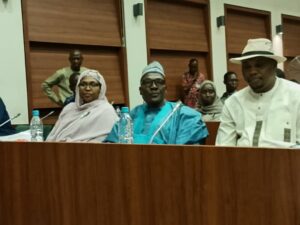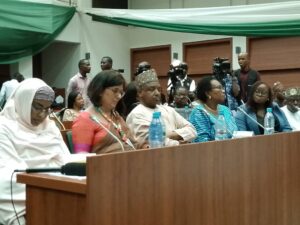House of Rep Unveil Committee to Mitigate Effects of Climate Change in Nigeria

By Fatima Saka
Nigeria House of Representative has Inaugurated Committee on Nutrition and Food Security to caution the effects of climate change across the country.
The inaugural meeting was held on Thursday at the National Assembly in Abuja, with relevant Stakeholders.



In his remarks, the Speaker House of Representative RT. Hon. Abbas Tajudeen, said that setting up this committee is very crucial to the vision of the House to “be
responsive, results-oriented and effective in performing its constitutional mandate towards the security and welfare of
Nigerians.
Hon. Abbas reiterated that Nigeria, like the rest of the world, is experiencing a
food crisis, exacerbated by climate change, rising inflation and pervasive insecurity.
The speaker who was represented by the Chairman House Committee on Nutrition and Food Security, Hon. Chike Okafor said that the decision of the House to set up a committee that would be dedicated to fashioning legislative and measures, actions to tackle the menace of food insecurity and malnutrition affecting our people.

Giving reports of the United Nation Office for the Coordination of Humanitarian Affairs (OCHA), the Speaker said according to UN office about 26.5 million Nigerians would be grappling with high levels of food insecurity in 2024
while the country is said to have the second highest burden of malnutrition in the world, with 32% of children under the age of five stunted or chronically malnourished.
He further stressed that Malnutrition currently impacts 35 million children under the age of five, among whom 12 million are stunted, 3 million are wasted, and 23.5 million suffer from anemia. An additional 17.7 million individuals are facing hunger, with 2.6 million children confronting severe acute malnutrition in 2024. Among women of childbearing age, 7% xperience severe acute malnutrition.
“These figures may exacerbate due to the current food inflation rate, which stands
at about 33.7% (according to the Central Bank of Nigeria).
He said:” the World Food Programme’s September 2023 publication of the ‘Nigeria Hunger Map’ estimates that 24.9 million Nigerians are in an acute or critical stage of hunger, categorized as an emergency, while 85.8 million Nigerians have
insufficient food consumption. Among this population, 47.7 million Nigerians resort to crisis-level or above-crisis-level food-
based coping strategies.
“The above data paints a very gloomy picture requiring urgent legislative action. This is particularly so given that some of the causative factors are issues within the legislative competence of the House to deal with. The food and nutrition crisis affecting us as a nation is partly caused by global warming and climate change, pervasive insecurity across the country which prevents farmers and herders from engaging in their various agricultural activities, poor Irrigation, outdated land tenure system, crude and traditional farm practices on subsistence levels as well as a myriad of other challenges.
“It is in the light of the foregoing that this Committee finds relevance and becomes very significant. As a committee, you
are expected to provide a legislative response to the worsening food insecurity and malnutrition in the country through effective oversight of policies and programmes towards addressing
these twin issues especially as the President had declared a state of emergency on food insecurity, review existing legislation and suggest new legislative frameworks that affect agricultural production, the food supply chain.
“Your task becomes more crucial and urgent in the face of rising food prices and high cost of living occasioned by the withdrawal of government subsidies on petroleum products. I have no doubt in
the capacity of the Chairman and members of the committee to deliver on this onerous task of providing immediate solution to the growing food and nutrition crisis in the country.
“ I urge this committee to enlist the support and collaboration of relevant stakeholders to achieve success in the overall interest of Nigeria. I have confidence in the competence of the chairman and members
of this committee to rise to the occasion and be able to come up with an effective legislative roadmap on how to deal with this ugly situation. I wish to urge every stakeholder and experts in this area to provide the needed support and partner with the Committee to meet the objective for which it was established.
“Let me also re-emphasize the position of the House to improved food and nutrition for our people In our resolve as a House to tame hunger in and malnutrition, pursue food security and sustainable development, we prioritized agricultural
development as a key legislative agenda based on our strong belief that agricultural sector is a critical factor in growing the
nation’s economy and scaling down poverty rate. Besides, We are committed to enacting policies and legislative frameworks towards supporting farmers with subsidies, access to credits
and modern agricultural equipment to stimulate enhanced agricultural productivity.
“This will also have a far-reaching Impact in addressing the multifaceted challenges of food insecurity and malnutrition.
“I am honored therefore to formally inaugurate this Committee as part of our legislative response to food insecurity and malnutrition in Nigeria.”
Following are the stakeholders at the Inaugural meeting; National Nutrition Core Working Committee, Federal Ministry Of Agriculture and Food Security, Ministry of Budget and Planning, USAID, World Bank, UNICEF and GAIN.





